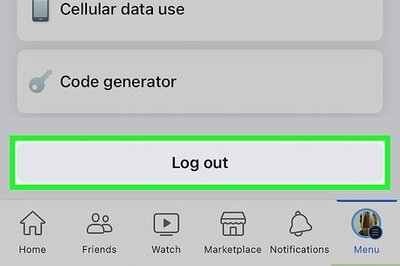
views
There is no need to press the panic button but India needs to monitor the clinical symptoms and severity of the disease caused by the XBB.1.16 variant closely, experts cautioned as the country begins reporting a fresh surge in cases of Covid-19.
On March 18, the country reported over 800 coronavirus cases in 24 hours, the highest single-day surge in the past four months.
According to latest data from the Indian SARS-CoV-2 Genomics Consortium (INSACOG), a total of 76 samples of the XBB.1.16 variant of Covid-19 have been detected in the country. This variant is believed to be behind the recent surge in cases, with examples found in Karnataka (30), Maharashtra (29), Puducherry (7), Delhi (5), Telangana (2), Gujarat (1), Himachal Pradesh (1), and Odisha (1).
The new strain has been found in 12 countries and is rapidly spreading in India, the US, Brunei, and Singapore.
“There is a new variant displacing old ones but so far, there is not much increase in severe cases,” Dr Anurag Agrawal, former director of CSIR Institute of Genomics and Integrative Biology (IGIB), told News18.com.
Now the dean of biosciences and health research at Ashoka University, Agrawal said the fresh surge is “nothing very unexpected”. “It could be probably due to declining immunity and new variant combining to give some increase in cases,” he said.
The XBB1.16 variant was first identified in January. But will this variant cause a fresh wave of the pandemic? “If wave means many hospitalisations and healthcare stress, then no. It is very unlikely,” Agrawal added.
Though there may be an increase in infections, the “increase will not be similar to previous waves”, he noted.
Features of XBB
According to Vipin M Vashishtha, former convenor of the Indian Academy of Paediatrics and consultant paediatrician at the Mangla Hospital and Research Centre, Bijnor, “XBB.1.16 has a 140 per cent growth advantage over XBB.1.5, making it more aggressive.”
Vashishtha tweeted saying “the variant has three additional spike mutations, E180V, K478R, and S486P, which have been identified by recent briefing. They didn’t mention that XBB.1.16 also has ORF9b:I5T and ORF9b:N55S mutations.”
“All eyes should be on India! If XBB.1.16 aka #Arcturus could succeed to wade through the ‘sturdy’ population immunity of Indians that successfully resisted the onslaught of variants like BA.2.75, BA.5, BQs, XBB.1.5, then the whole world must be seriously worried!!” he added. (Sic)
Need to stay vigilant
Another expert, Dr Vishal Rao, a member of Karnataka’s genomic surveillance committee, told News18.com that clinically, there is no reason to hit the “panic button” as Covid-19, for now, will only lead to “flu-like symptoms”.
However, he said, there are two points that global experts need to closely watch in the coming days.
“One is the recombinant virus (when two strains combine within a cell to create a new strain) and the other is Antibody Enhanced Disease (AED) leading to increased infectivity and virulence owing to poor antibody response from the body.”
Rao, who is also the dean for the Centre of Academic Research at Bengaluru-based HCG Cancer Hospital, further explained that “we noticed the presence of cases with recombinant variants such as XBB and XBB.1 in Bengaluru in September 2022. XBB1.16 is yet another evolving variant which is trying to evade the immune system and overcome vaccine efficacy”.
He added: “As it gathers critical mass, it may gain the capability to enter lungs or other organs and hence, we need to continue sequencing and clinically being vigilant.”
In a cautionary note, Rao said: “The immune system’s response to the new variant could be dampening and even our antibody quantity is reducing. The virus enters the lungs through TMPRSS2. Delta had access to TMPRSS2 while Omicron did not know how to go via that route. We cannot say that it will never learn to enter lungs via TMPRSS2. The natural course of this virus is to evolve and we need to monitor the virus closely in case it starts behaving maliciously.”
Read all the Latest India News here



















Comments
0 comment